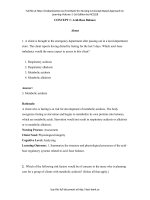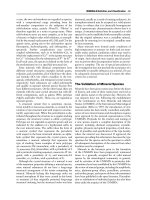Ancient philosophy a new history of western philosophy volume 1 (new history of western philosophy) ( PDFDrive ) 168
Bạn đang xem bản rút gọn của tài liệu. Xem và tải ngay bản đầy đủ của tài liệu tại đây (25.35 KB, 1 trang )
4
Knowledge and its Limits:
Epistemology
here is a branch of philosophy nowadays called epistemology: the
inquiry into what can be known, and how we can know it. We all have
many beliefs on many topics; which, if any of them, can count as real
knowledge? What is the mark of genuine knowledge and how does it diVer
from mere belief? Is there a reliable way to acquire knowledge of the truth
to eliminate false beliefs that are mere seemings? These questions occupied
the attention of Greek thinkers from an early stage.
T
Presocratic Epistemology
Parmenides might well claim to be the founder of epistemology: at least he is
the Wrst philosopher to make a systematic distinction between knowledge
and belief. At the beginning of his great poem a goddess promises that he will
learn all things, both reliable truth and the untrustworthy opinions of
mortals. The poem is in two parts: the way of truth and the way of seeming.
The way of truth sets out Parmenides’ theory of Being, which we will
consider in Chapter 6 on metaphysics. The way of seeming deals with the
world of the senses, the world of change and colour, the world of empty
names. Mortals who do not accept the way of truth, sunk in metaphysical
error, know nothing at all. Deaf, dazed, and blind, they can be called ‘twoheaded’ because of the internal inconsistencies of their beliefs (KRS 293).
A sharp contrast between reality and appearance also appears in the
writing of a very diVerent philosopher, Democritus. For him, atoms and









